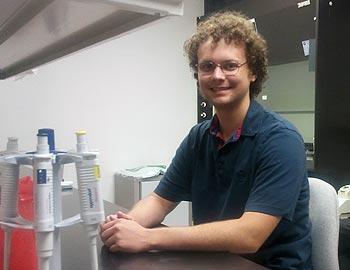When it comes to getting some hands-on experience, Chase Ridenour isn’t afraid to ask.
That straightforward approach—combined with talent, planning and focus—has set up a senior year to remember: six months working at the Eijkman Institute of Molecular Biology in Jakarta, Indonesia. And he won’t be washing test tubes.
“This will be a life-changing experience,” Ridenour said. The Northern Arizona University senior, pursuing a double major in biology and chemistry, will genotype blood samples from the island of West Sumba as part of a major government project to combat malaria. He will then design new methods of identifying and testing a genetic variant known as G6PDd.
Asking for the opportunity “took some guts,” Ridenour said, but that actually turned out to be the easy part. Once the lab agreed to host him, all he had to do to get there was earn three scholarships, negotiate with two consulates and convince a department chair to approve 12 credits of research experience toward graduation.
The journey began with Ridenour doing what had worked for him as a freshman: simply asking for an opportunity. Back then, he hung around after class with professor Michael Ketterer, talking chemistry and asking questions. One of them, eventually, was whether Ridenour could get a spot in Ketterer’s analytical chemistry lab. The answer was yes.
|
By last year, Ridenour transitioned to assistant professor Jason Wilder’s genetics research lab as a way to fulfill his Beckman Scholarship.
There, he met Ari Satyagraha, one of Wilder’s collaborators from the Eijkman Institute. Conversations ensued. An invitation from Satyagraha to intern at the Indonesian lab followed. But Ridenour would have to figure out how to get there.
Ridenour began simply enough. “I just went to the NAU website and started looking at international scholarships,” he said. His self-motivated pursuit, with guidance from Danielle Varnes and Jannan Poppen in the Center for International Education, brought him to three scholarship applications—all of which resulted in awards: The Benjamin A. Gilman International Scholarship, via the U.S. State Department; the GO scholarship, granted through CIE; and the Bayless Scholarship, awarded by the Department of Biological Sciences. Together, they are financing Ridenour’s internship.
Once in Indonesia, Ridenour will contribute to a study with widespread implications for malaria prevention. “A G6PDd deficiency,” he explained, “is strongly correlated to resistance to one form of malaria, Plasmodium vivax. But those with the deficiency also may react negatively to anti-malarial drugs.” A reaction, he said, which can be fatal. “The government needs to know where to use which anti-malarial drugs.”
Ridenour plans to post updates to his “Take That, Malaria” blog during the internship, in part to fulfill the terms of his Gilman scholarship, and he hopes to informally pick up some foreign language skills while there. After his return and graduation, he expects to take a year off.
“I haven’t had a ton of time to look at grad schools,” he said. “I’ve thought about the idea of going to med school, so I’ll probably look at volunteering at a hospital. And I’ll try to get into a lab just to keep my skills up.”
If experience means anything, all he’ll have to do is ask.



